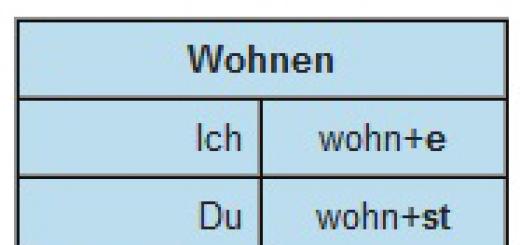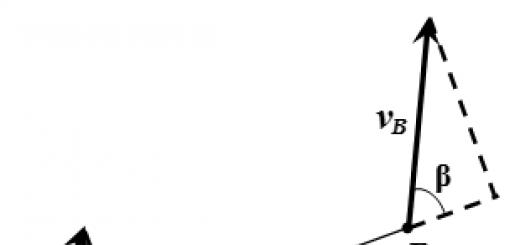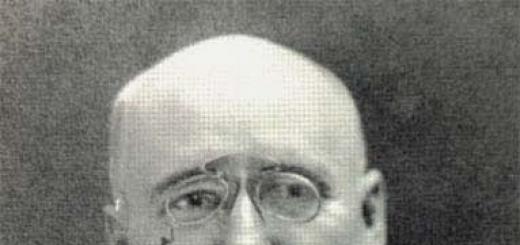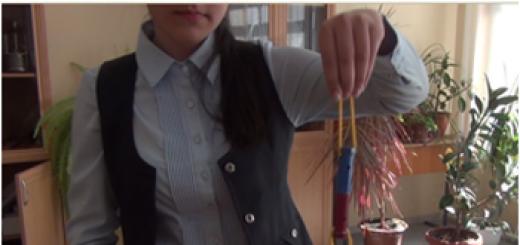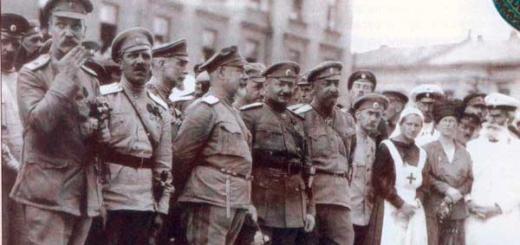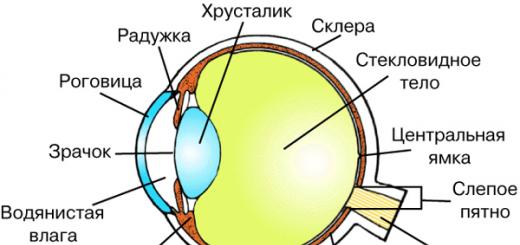Conjugation of the verbs haben and sein in the present
Let me remind you that present (Präsens) is the present tense of the verb. Verbs haben"have" and sein“to be, to appear” are the most frequent in the German language, since their functions are very diverse. Beginners learning German, as a rule, take them up at the very first steps, because it is impossible to do without it. It is important to know that these verbs are irregular, since the formation of their forms in the present tense (and not only in the present) differs from the generally accepted one. But there is no harm in this: frequency verbs quickly enter the vocabulary of beginners, since they will have to work with them very often. And in the future, conjugating irregular verbs will become automatic. Actually, let's move on to verbs.
In Russian we say: “I am an actor”, “you are a teacher”, “he is a student”. The Germans literally say: “I am an actor,” “you are a teacher,” “he is a student.” In this case we use the verb sein, which has various shapes. If we want to say “I have (something or someone)”, we use the verb haben. Literally, the Germans say “I have (something or someone).” To say all this in German depending on person, number and gender, refer to the table below.
The table is quite easy to navigate. You associate the desired personal pronoun (§ 15) with the desired verb and then put the word you need (nouns take the required number). For example, verb sein with a noun:
You can, for example, say “I am good”, “he is bad”. In this case, after the verb there is a regular adjective without any changes.
With verb haben in the same way, just don’t forget about articles (§ 7), if they are needed. And one more thing... since you can have anything and in any quantity, nouns can be in any number.
There are some stable phrases like Zeit haben"to have time" Unterricht haben"to have classes" Angst haben“to be afraid”, which can be without an article.
- Ich muss los. Ich habe keine Zeit.- I have to go. I have no time.
- Heute habe ich Unterricht.- Today I have classes.
- Ich habe Angst vor diesem Hund.- I'm afraid of this dog.
Verbs sein And haben also participate in the formation of various tense constructions as auxiliary verbs. More on this in other paragraphs.
In this lesson we will look at the most important German verbs: haben and sein. It is with these verbs that you need to start learning German. Why these verbs are so important and where they are used, seelesson from Start Deutsch:
After watching the lesson, read presentation again and learn all the unfamiliar phrases:
Phrases You can print and memorize:
Ich habe ein Buch - I have a book
Du hast Fieber - You have a fever
Sie hateinen Hund - She has a dog
Wir haben Hunger - We are hungry
Ihr habtdie Wahl - You have a choice
Sie haben Fragen - They have questions
Sie haben Ideen - Do you have ideas?
Ich bin Anna - I am Anna
Du bist gesund - You are healthy
Es ist kalt - Cold
Der Tisch ist groß - Large table
Wir sind Studenten - We are students
Ihr seid sehr klug - You are very smart
Sie sind hier - They are here
Conjugation table for haben and sein. Print it out or copy it down and memorize it!
Exercises
1. Complete interactive exercises:
2. Do exercises to conjugate the verb sein:
Exercises on sein.pdf
3. Do the "Pets" exercise start, and the exercise will begin.
4. Do the exercise "Dimensions". In the window that appears, click the word at the top right start, and the exercise will begin.
5. Do the exercise "Colors". In the window that appears, click the word at the top right start, and the exercise will begin.
6. Complete the exercise "Describing Pets". In the window that appears, click the word at the top right start, and the exercise will begin.
Lyrics of the song:
Hast du ein Tier? - Do you have a pet?
Ja, ich habe ein Tier. - Yes, I have a pet.
Und was für ein Tier? - And what kind of animal?
Ich habe einen Hund. - I have a dog.
Und wie heißt dein Hund? - And what is your dog’s name?
Rufus heißt mein Hund. - Rufus is my dog's name.
Und wie alt ist dein Hund? - And how old is your dog?
Er ist sieben Jahre alt. - He is 7 years old.
Hat dein Hund Federn? - Does your dog have feathers?
Nein! Er hat keine Federn! - No! He has no feathers!
Keine Schuppen? Keinen Panzer? - No scales? No shell?
Nein! Er hat (ein) Fell. - No! He has fur.
Ist er klein oder groß? - Is it small or big?
Mein Hund ist sehr groß! - My dog is very big!
Dein Hund ist sehr groß? - Is your dog very big?
Ja, genau wie ich. - Yes, the same as me.
Und ist er braun oder schwarz? - Is it brown or black?
Mein Hund ist ganz schwarz. - My dog is completely black.
Seine Ohren sind auch schwarz? - Are his ears black too?
Ja! Er ist ein schwarzer Hund. - Yes! He's a black dog.
In German, the verb (vb) sein can be called the main verb. With its help, tenses and other language structures, as well as idioms, are constructed. German verb. sein in its functionality is an analogue of the English verb. to be. It has the same meaning and also changes its form when conjugated.
German verb. sein as an independent verb. in its full lexical meaning it is translated as “to be.” In the present tense (Präsens) it is conjugated as follows:
Singular (singular)
Ic h (I) – bin (there is)
Du (you) – bist (there is)
Er/sie/es (he/she/it) - ist (is)
Plural (plural)
Wir (we) - sind (there is)
Ihr (you) - seid (there is)
Sie/sie (You/they) - sind (there is)
In the past incomplete tense (Präteritum) it is conjugated as follows:
Singular (singular)
Ich (I) – war (was/was)
Du (you) – warst (was/was)
Er/sie/es (he/she/it) - war (was/was/was)
Plural (plural)
Wir (we) - waren (were)
Ihr (you) - wart (were)
Sie/sie (You/they) - waren (were)
The third form of the verb sein – gewesen is not conjugated.
According to its structure, a German sentence cannot exist without verbs; in the case of the verb sein, when translating, we do not always translate it.
For example: Ich bin der Zahnarzt und meine Ehefrau ist die Deutschlehrerin. – I am a dentist, and my wife is a German teacher.
Heute sind sehr viele Programme in diesem Gebiet. – Today there are many programs in this area.
We can use the German verb. sein in twelve different shades:
- 1. when indicating (indicative) the quality, condition or status of someone or something: Das Wetter ist gut. - Good weather. Meine Mutter ist die Hausfrau. - My mom is a housewife.
- 2. when indicated. and the location or location of someone or something: Weißt du, wo meine Schlüssel sind? - Do you know where my keys are?
- 3. when indicated. time and place of someone's event: Weißt du noch, wann die erste Mondlandung war? – Do you know when the first moon landing was?
— 4.+ zu + Infinitiv when specified. to the fact that something is going to happen or something needs to be done: Die Rechnung ist innerhalb von 5 Tagen zu überweisen. – The invoice must be paid within 5 days.
- 5. + zu + Infinitiv when indicated. that something else can be done (taking into account spiritual, physical or material factors): Diese Schachpartie ist noch zu gewinnen. – This game of chess can still be won.
- 6. (gerade) bei etw./am + substantiviertem Infinitiv when indicated. to the fact that someone is doing something right now: Er ist gerade dabei, das Fahrrad zu reparieren. - He is repairing his bicycle now.
— 7. when indicated. to the fact that someone or something comes from a certain place: Ich komme aus der Ukraine. - I'm from Ukraine.
— 8. when indicated. to the fact that something came from someone: Ich weiß nicht, von wem diese Blumen sind. – I don’t know who these flowers are from.
— 9. when indicated. to have a positive or negative attitude towards someone or something: Monika ist dafür, dass wir heute eine Party machen. - Monica (she likes) that we are having a party today. Ich bin gegen diesen Ausflug. - I am against this campaign.
- 10. upon notification that someone is no longer alive: Seine Frau ist nicht mehr. - His wife is no longer there.
- 11. when indicating someone’s condition: Ich muss ausgehen, mir ist schlecht. - I need to go out, I feel bad.
- 12. when indicating your attitude towards something: Nach so viel Stress war mir nicht nach Feiern. – After such stress, I had no time for celebrations.
In addition to the fact that the German verb. sein is used as an independent verb, it can perform the function of an auxiliary verb. to form the past tense forms Perfekt and Plusquamperfekt.
When forming the past complete tense (Perfekt), sein, as an auxiliary verb. conjugates in the present tense and comes second in a simple preposition, and the perfect participle of the main verb. stands at the very end: Gestern bin ich nach München gefahren. – Yesterday I went to Munich.
Auxiliary verb. sein forms Perfekt only with verbs denoting movement, change of state, as well as exceptions: sein (to be), werden (to become), bleiben (to stay), begegnen (to meet), gelingen (to succeed), misslingen (to fail), geschehen (happen), passieren (happen).
When forming the past complete tense (Perfekt), sein, as an auxiliary verb. conjugates in the past tense Präteritum and comes second in a simple sentence, and is the perfect participle of the main verb. stands at the very end: Sie waren seit langem nach Belgien umgezogen. – They moved to Belgium a long time ago.
With additional explanations.
What you can do after this lesson:
Tell us your name, what you do (study, work, retire), where you live, how old you are
Use phrases that Germans often use in their daily lives
The German language has the following pronouns:
The iron rule of the German language: All verbs in German always have a stem plus the ending -en or simply -n
Wohnen (live)
denken (to think)
heißen (to name, to be called)
lernen (to teach)
studieren (to study)
verdienen (earn)
arbeiten (to work)
kommen (to come, to arrive)
sprechen (to speak)
speichern (save, preserve)
In order to correctly put the verb into the required form, for example, the verb “to live” – wohnen, and to say “he lives” and not “he lives”, you need to remove this ending -en and, depending on the pronoun, add the following endings to the stem verb:
Ich wohn+e – I live
Du wohn+st - you live
Er, sie, es wohn+t – he, she, it lives
Wir wohn+en – we live
Ihr wohn+t – you live
Sie, sie wohn+en - You live, they live

The verb “to think” that is often used in life is denken:
Ich denk+e – I think
Du denk+st – you think
Er, sie, es denk+t – he, she, it thinks
Wir denk+en – we think
Ihr denk+t – you think
Sie, sie denk+en - You think, they think
The verb heißen is to call, to be called (the letter ß is read as “ss”). Without it, you cannot introduce yourself or ask what the name of this or that object is. It changes a little not according to the rules, but at this stage you just need to remember it.
Ich heiße - my name is
Du heißt - your name is
Er,sie,es heißt – his, her name; it is called
Wir heißen – our name is
Ihr heißt - your name is
Sie, sie heißen - Your name is; calling them
The iron rule of the German language: VERB always comes in 2nd place!
Exercise 1.
Ich heiß _______ Peter. (heißen – to call, to be called)
Ich lern _______ Deutsch. (lernen – to teach)
Ich wohn ________ in Moscow. (wohnen - live; in Moskau - in Moscow)
Ich studier _________ nicht. (studieren – teach, study, nicht – not)
Ich verdien ________ gut. (verdienen – earn, gut – good)
Aber ich arbeit ________ viel. (aber – but; arbeiten – to work; viel – a lot)
Mein Freund komm ________ aus Deutschland. (mein Freund - my friend; kommen - to come, to come; aus Deutschland - from Germany)
Er heiß ________ Richard.
Er arbeit _________ hier auch. (also – also)
Er wohn _________ in Moscow.
Exercise 2.
Ihr lern _______ Deutsch.
Wir studier ________ viel.
Du wohn __________ in Moscow.
Ihr studier _________ zusammen. (zusammen – together)
Sie (she) lern ________ hier.
Er arbeit ________ dort. (dort – there)
Die Gruppe arbeit ________ zusammen. (die Gruppe - group)
You may have noticed that some words in the exercises are capitalized.
Iron rule of the German language: All nouns are written with a capital letter.
Now let's add your age to this. Let's limit ourselves to those numerals that are most often used in life.

To the numerals we will add another very important verb in the German language, sein - “to be”. Analogous to the English “to be”. In Russian, the dash is often replaced or simply omitted.
Foreigners say:
I am a man. It's in the park. She is at home. We are in Kyiv. They are happy. I am sick. She is healthy.
We are speaking:
I am a man. He (is) in the park. She (is) at home. We (are) in Kyiv. They (are) happy. I (am) sick. She (is) healthy.
The verb does not change according to the rules, you just need to remember:

Using the verb sein you can talk about age:
Ich bin sechsundzwanzig(26) Jahre alt (literally “I am 26 years old”) - I am 26 years old.
Er ist vierzig(40) Jahre alt – he is 40 years old.
Du bist zwanzig(20) Jahre alt - you are 20 years old.
Exercise 3. Verb sein (to be).
Ich _____ Student. (student)
Ich _____ faul. (lazy)
Ich ______ nicht verheiratet. (verheiratet sein – to be married, to be married; nicht – not)
Sie _____ ledig. (ledig – unmarried, unmarried)
Der Text ______ schwer. (der Text – text, schwer – complex)
Der Platz hier _______ frei. (der Platz – place; hier – here; frei – free)
Wir _______ aus Moscow. (aus Moskau – from Moscow)
Das ______ ein Zimmer. (das Zimmer – room)
Das _______ die Leute. (die Leute – people)
Main Name _______ Alexander. (mein Name - my name)
Du _______ mein Freund. (mein Freund - my friend)
Du ______ toll. (toll – super, class)
Ich ______ der Rentner. (der Rentner - pensioner)
Language support: http://speakasap.com/pomosh_v_nemeckom_yazyke.html ( [email protected])
Let's sum it up:
You can already tell what your name is, where you live, where you work, where you come from, whether you earn good money, whether you study or work, how old you are.
Phrases that Germans use with the verb sein:
Das ist toll! – this is great, class!
Das ist wunderbar! - it's amazing!
Das ist köstlich – it’s delicious
Ich bin müde - I'm tired
Ich bin zufrieden - I am satisfied
Ich bin unzufrieden - I am dissatisfied
Ich bin satt - I'm full, I'm full
Ich bin fertig - I'm ready
The familiar phrase Das ist phantastisch! in 3 years of living in Austria and Germany I have never heard a German speak :)
Yes, and the Germans don't say arbEIten, they say Arbeiten with an emphasis on the first letter. This is how the knowledge of the German language reaches us in a slightly distorted way.
If you don’t want to be deported or completely ignored in Germany, it’s better not to shout phrases like Hände hoch, nicht schießen, Hitler kaput at every corner, demonstrating your erudition :)
